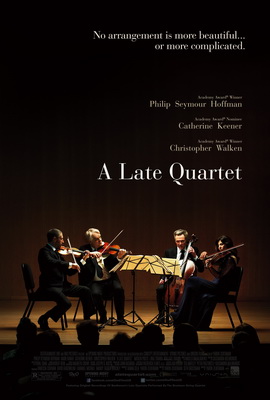The Fugue Quartet has been playing music together successfully for twenty-five years, but from the early scenes of A Late Quartet, it is clear that the emotional and musical cohesion of the group is breaking down, and the quartet soon appears to be in danger of breaking up.
The quartet’s leader, cellist Peter Mitchell (Christopher Walken), lost his wife a year ago and has just been diagnosed with Parkinson’s disease. He declares that the Fugue’s first concert of the season will be his last and asks the group to begin looking for a replacement for him. Violist Juliette (“Jules”) Gelbart (Catherine Keener) is married to second violinist Robert Gelbart (Philip Seymour Hoffman), but the marriage is clearly devoid of bliss. First violinist Daniel Lerner (Mark Ivanir) is obsessed with musical precision, marking up every score with copious notes and directions. Lerner is single but had an affair with Jules before she married Robert; he falls in love with the Gelbarts’ daughter Alexandra, also a violinist.
The imminent changes to the group’s dynamics bring some old resentments and conflicts to the surface. Robert declares that he no longer wishes to play “second fiddle” to Lerner, demanding that the roles of first and second violin alternate between the two players. This suggestion is rejected out of hand by Lerner and Jules agrees with the first violinist, setting Robert off on an offended and jealous rage, which leads to a one-night stand with a flamenco dancer with whom he regularly jogs. The affair results in Jules asking Robert to move out. When Jules discovers that Alex is sleeping with Lerner, an explosion of pent-up daughter-mother resentment ends with Jules slapping Alex hard across the face and fleeing Alex’s apartment. Robert’s discovery of Lerner’s affair with his daughter leads to fisticuffs between him and the first violinist in Peter Mitchell’s house, resulting in Mitchell kicking them all out in disgust. Alex breaks up with Lerner.
These events appear as if they are essential ingredients in a cheesy afternoon soap opera, but A Late Quartet is decidedly not gratuitous melodrama. The humanity and devotion to musical artistry of the characters (and the marvellous performances of the actors who portray them) elevate this film to a work of rare beauty.
Peter Mitchell is a man of compassion, sensitivity, and sophistication. He is devoted, with quiet passion, to his late wife, an opera singer, to the quartet, and to each of its members. He is a skilled and patient teacher of young musicians. And he greets the end of his performing career and the approach of the devastation of Parkinson’s with a sublime grace. Christopher Walken, not known for the depth and range of his acting skills, is a delightful surprise here.
Robert Gelbart is a man of many facets – a brilliant musician who longs to take risks in his playing (but is frustrated by the cautious, controlled playing of Lerner), a loving husband and father, a volatile and formidable opponent in any dispute, an impulsive adolescent. As usual, Hoffman, like the great Meryl Streep, completely inhabits his character, bringing nuance to Robert that renders him utterly believable. Hoffman’s performance exemplifies the difference between craftsman and artist.
Jules is a complex person. She adores Peter, as if she is in need of a loving father, and her love and need blind her to the reality that Peter can no longer perform publicly with the quartet. For Jules, the music is everything; she cannot understand her daughter’s resentment of the long absences of her parents during the group’s many concert tours while she was growing up. She rejects her husband’s amorous advances as well as his suggestion that he share the first violin role with Lerner. Yet, in her way, she loves both Robert and her daughter.
Lerner’s almost neurotic need for precision – in his playing, in his search for the perfect bow, in the elaborate marking of each score – masks a passion, a desire to love and to be loved that is released in his affair with Alex. When she ultimately rejects him, he retreats to the stern and cold technician that is his comfort zone.
This film is about change and growth and new beginnings. The crisis precipitated by Peter’s illness and the relational conflicts that it engenders cause each of the members of the Fugue to examine himself or herself and to make the necessary personal adjustments that restore harmony to the quartet. It is a credit to the makers of this film and to the actors that bring it to life that these changes are not forced or false; rather, they appear to arise naturally from the circumstances and character of each member of the group.
Image Credit
“A Late Quartet Poster.” Wikipedia (free use policy)
Recent Ross Lonergan Articles:
- The Film-School Student Who Never Graduates: A Profile of Ang Lee, Part Four
- The Film-School Student Who Never Graduates: A Profile of Ang Lee, Part Three
- The Film-School Student Who Never Graduates: A Profile of Ang Lee, Part Two
- The Film-School Student Who Never Graduates: A Profile of Ang Lee, Part One
- Bullying, Fear, And The Full Moon (Part Four)



Please Share Your Thoughts - Leave A Comment!